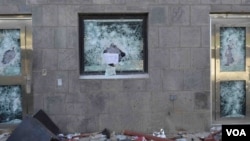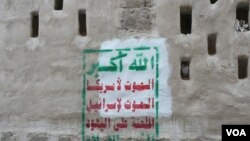SANA'A —
The mid-September deployment of an elite team of 50 Marines to the U.S. embassy in Yemen has fueled growing opposition to Washington’s role in the small Arab nation, which remains mired in a fragile political transition after a tumultuous year of uprisings dethroned President Ali Abdullah Saleh after 33 years of authoritarian rule.
The increased security measures, a reaction to violent riots on September 13 that engulfed the heavily-guarded complex in Sana'a and left four dead, came on the heels of two suspected U.S. drone strikes that killed more than a dozen civilians.
“Even though they’re trying to kill al-Qaeda, it’s not their responsibility,” tribal leader Al-Hasan Abkr of Al-Jawf governorate said about the American drones, which in June helped Yemeni troops reclaim territory seized by an offshoot of Yemen-based al-Qaeda in the Arabian Peninsula (AQAP).
“Drones, Marines, anything, we refuse it,” Abkr shouted.
Yemen's parliament voiced similar concerns about issues of sovereignty after Washington announced its decision to send the Fleet Antiterrorism Security Team (FAST) to bolster security at the embassy in Yemen's capital. "The Parliament of Yemen strongly rejects any foreign military presence on Yemeni soil, whether big or small ... under any pretext," a statement read.
American ambassador to Yemen, Gerald M. Feierstein, said in a statement that the “temporary assignment of additional personnel to assist U.S. missions facing security challenges is normal” and “in accordance with international laws.”
“The [FAST] mission is strictly limited to assisting at our diplomatic facilities and protecting U.S. diplomatic personnel from violence” during the repair of structural damage from the riots, he wrote.
Yet against the backdrop of heightened security precautions at U.S. missions across the Muslim world — particularly after last month's attack in Benghazi, in which heavily armed assailants killed U.S. ambassador to Libya Christopher Stevens along with three other Americans — the White House, which did not immediately respond to inquiries about the recent deployment, appears reluctant to specify when the FAST unit will depart.
With presidential elections a few weeks away, the additional Marines in Sana’a will likely remain on embassy grounds until at least November, when Yemen’s controversial National Dialogue Conference is scheduled to convene the country’s disparate power blocs in an attempt to lay foundations for unification.
Controversial remarks by transitional President Abd Rabu Mansour Hadi during his first trip to Washington in late September may have further complicated his domestic agenda. President Hadi, who was swept to power in February as part of a Gulf-brokered and U.N.-backed power-transfer deal, defended drone strikes as a critical tool in the ongoing battle against AQAP, which has attempted several attacks on the U.S. homeland since 2009, including the “underwear bomber” and the “toner bombs” plots.
In a recent interview with The Washington Post, Hadi spoke to the superior technology of drones and argued that the U.S. and Yemen have taken “multiple measures to avoid mistakes of the past,” alluding to collateral damage.
He also announced that he gives prior consent for each American strike, 44 of which have taken place since last year, according to a tally by The Long War Journal. About three-fourths of those strikes have taken place under Hadi’s administration.
The unofficial drone campaign is also open-ended, designed to apply pressure on AQAP while Hadi restructures the highly divided military and prepares it to address the threat itself.
Despite two rounds of presidential decrees stripping the ex-president’s relatives and loyalists of top military posts, the two most powerful commanders — Saleh’s eldest son Ahmed of the Republican Guard, and the former president’s kinsman Ali Mohsen al-Ahmar, who last year defected from the Saleh regime to protect anti-government protestors with his First Armored Division — still control their respective divisions of the fractured army.
Against this backdrop, Shaykh Abkr from Al Jawf said that regardless of how limited or temporary the Marine mission may actually be, “it gives a chance to al-Qaeda and other groups to make problems bigger and bigger.”
“It was a really big mistake,” he said.
Since the embassy siege, the Zaydi Shi’ite Huthi movement has raised its profile in Sana’a, opening new offices, protesting U.S. involvement in the political transition and flooding the capital with signs bearing its anti-American slogan, “Death to America, Death to Israel, Curse upon the Jews, Victory to Islam.”
The Huthis, which since 2006 have fought in six battles with the central government in defense of their homeland in northern Saada governorate, represent a key political obstacle in President Hadi’s bid to unify Yemen ahead of multiparty elections in 2014.





